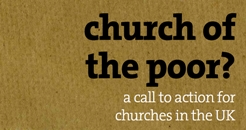 What does it mean to be a poor church, for the poor?
What does it mean to be a poor church, for the poor?
Church Action on Poverty published a report in June 2016 with contributions from thinkers and leaders of many denominations on Pope Francis' call “I want a Church that is poor and for the poor”.
Here are some quotes from the report:
Pope Francis himself writes about why he would like to see a poor church for the poor, "Our commitment does not consist exclusively in activities or programmes of promotion and assistance; what the Holy Spirit mobilises is not an unruly activism but above all an attentiveness which considers the other in a certain sense as ‘one with ourselves’. This loving attentiveness is the beginning of a true concern for their person which inspires me effectively to seek their good. This entails appreciating the poor in their goodness, in their experience of life, in their culture, in their ways of living the faith.”
Gustavo Guttierrez, Peruvian liberation theologian and Dominican priest says "There is no true commitment to solidarity with the poor if one sees them merely as people passively waiting for help … The goal is not to become “the voice of the voiceless” but to help those without a voice find one"
Dorothy Day, US journalist and activist observes, "The gospel takes away our right forever, to discriminate between the deserving and the undeserving poor."
Of course, Catholic Social Teaching has been around for over 100 years. It is based on the belief that God has a plan for creation, a plan to build a kingdom of peace, love and justice. Our part in this plan isn’t just limited to our spiritual life, it also involves every aspect of our lives and that must involve a vocation for the common good, a call to treat everyone as sisters and brothers in something that we all share.
Al Barrett, an Anglican priest living on an urban ‘outer estate’ in the West Midlands comments, "A church where all are welcomed and embraced. A church for the poor would be challenging, disturbing, in a society that prefers to keep the poor at arm’s length, if not out of sight and out of mind."
Philip North, Angican Bishop of Burnley urges "...every effective renewal movement in the history of the Church has started with the poor. When people see a Church that practises what it preaches, that listens to the cry of the poor, that challenges the values of the world, they sit up and listen. A Church that abandons the poor has abandoned God... A Church that is serious about renewal puts the poor first, not last."
John Sentamu, Archbishop of York, in the Commission on Poverty Report observed, "We found a stark divide between decision-makers and the people they claim to represent... Our evidence shows that at the root of poverty is powerlessness. Genuine participation is a human right and if things are to change, people living in poverty must have a real voice in the decisions that affect their lives".
Rachel Lampard, Vice President of the Methodist Conference challenges, "Today’s challenge is to be a church of the poor – for if we are not, how can we understand the reality of poverty, how can we be challenged by the reality of poverty, how can we base our action on the experience of poverty, and in short how can we genuinely call ourselves a church for the poor?"
Revd Dr Clare McBeath, Co-Principal of the Northern Baptist College writes, "We are called by the God who had nowhere to call home to let go of security and embrace a radical openness to each other. We are called by the crucified God to let go of power and embrace vulnerability. We are called by the resurrected God to let go of fear and live out a radical love, a new community, God’s kin-dom here on earth. And it starts with us, each one of us."
Martin Johnstone, secretary of the Church of Scotland’s Church & Society Council speaks of working with the poorest 60 neighbourhoods in Scotland, "That the Church is still there when so many others have walked away is, in itself, a sign of God’s abiding presence. On a daily basis many incredible things happen. Food is shared. Prayers rise to heaven. Children laugh. People work for justice. Gospel stories are lived out. Lives are transformed."
Greg Smith of Together Lancashire, Evangelical Alliance and William Temple Foundation comments, "We are certainly more aware and more concerned [about poverty]. Yet we are not so good at asking the question “why” or understanding the political and economic causes of destitution in our land. Nor are we very good at listening to and sharing the stories of the poor. And very few churches are cultural settings or communities where people struggling with poverty can really feel comfortable, truly welcome and fully belong. There is still much to do before the church as a whole moves from being for the poor to being alongside and of the poor."
Society of Friends’ Advices and Queries, "Bear witness to the humanity of all people, including those who break society’s conventions or its laws. Try to discern new growing points in social and economic life. Seek to understand the causes of injustice, social unrest and fear. Are you working to bring about a just and compassionate society which allows everyone to develop their capacities and fosters the desire to serve?"
Download the report from the Church Action on Poverty site
Retweet about this article:
Geoff Knott, 12/07/2016